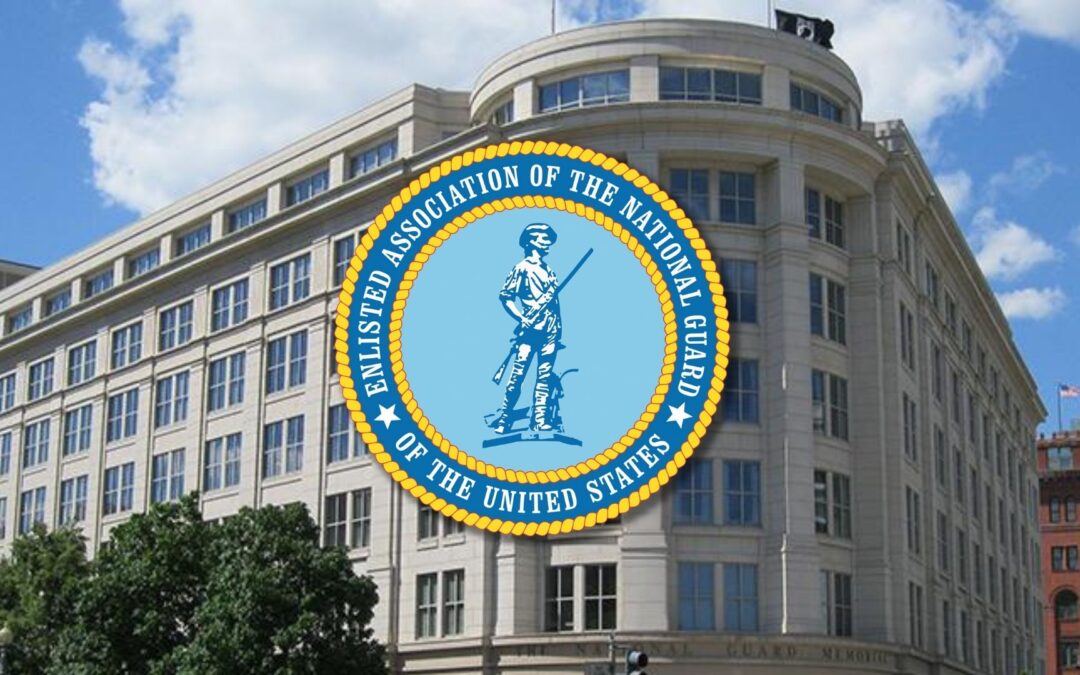To: EANGUS Members
From: EANGUS National Office
Please share the following Roll Call: Drill Weekend Talking Points with other unit members
Taxes: Update Tax Laws and Policies to Reflect Changes in the Military
By Kevin Hollinger
As we are well into the 118th Congress, EANGUS would like to update you on our work to improve the current Tax laws for both Servicemembers and employers. As a retired enlisted servicemember, I understand our everyday financial struggles and the important role employers play in recruitment and retention. Below you will see some of the proposals the EANGUS Legislative team has been working on, and as always, if you have questions or concerns, please feel free to contact me.
Tax Credit for Employers
EANGUS urges the 118th Congress to establish a tax credit for employers who hire Guard and Reserve members and retain them through periods of deployments 26 U.S. Code § 38. General business credit.
Guard and Reserve servicemembers continue to experience problems maintaining employment because of the demands for meeting the increased operational support provided to active duty. While employers have tried to support national security, it would be naïve to think they are not encountering problems during these times. Companies are absorbing the cost of replacing servicemembers with temporary employees or increasing overtime to fill the vacancy of mobilizations. Servicemembers have told EANGUS that they are seeing fewer and fewer Guard and Reserve hired because of the cost and disruption to companies. Because tax credits aim to promote a specific behavior, EANGUS believes offering tax credits to companies will encourage them to hire and retain Guard and Reserve members.
Travel Expenses
EANGUS urges the 118th Congress to amend Title 26 U.S.C. §62(a)(2)(E) to decrease the distance for the above-the-line deduction for travel expenses.
It is time to amend the tax code to change the above-the-line deductions for Guard and Reserve members who travel more than 50 miles from their residence. Currently, the law only allows the deduction when performing military duty 100 miles from their home. This change would align the Guard and Reserve with comparable 50-mile criteria for other deductions, such as moving expenses and funeral honors. This change should have occurred ten years ago when the 2005 Defense Base Realignment and Closure Commission recommended 182 closures or realignment recommendations. History has shown that BRAC implementations result in fewer installations, increasing the distance Guard and Reserve members must travel to perform duty. The 114th Congress proposed this bi-partisan legislation as H.R. 4658, The Fair Treatment for our National Guard and Reservists Act.
T.S.P. Contribution Limits
EANGUS urges the 118th Congress to exempt Title 26 USC 401(k) Guard and Reserve employee and government contribution limits from the new “blended retirement” plan.
Under the new blended retirement program, some Guard and Reserve members will be forced to surrender some of their civilian retirement if they want to contribute to their military retirement because of contribution limits set by the I.R.S. Many individuals work in civilian jobs with 401k retirement programs when not in military service. For example, while members could split the $18,000 (2015) limit between the two places of employment, they would be undercutting their retirement pensions in their civilian and military retirement plans. EANGUS met with senior leaders from the Pentagon, who expressed no intent to reduce retirement benefits for Guard and Reserve through tax law. EANGUS believes this was an unintended consequence due to being unfamiliar with Title 26.
Tax Penalties
EANGUS urges the 118th Congress to update I.R.S. Revenue Procedure 2016-47 to allow Guard and Reserve members on military deployment to qualify for a waiver of the 60-day rollover requirement.
Of the eleven conditions specified by the I.R.S. as acceptable reasons to request a penalty waiver for exceeding the 60-day rollover requirement, none allow for a release in the event of a military deployment. Some of the conditions the I.R.S. does consider valid to justify a release include the taxpayer losing the check, if a taxpayer’s family member died or was seriously ill, and even if the taxpayer was incarcerated. EANGUS believes that a taxpayer who is a military member on deployment should be afforded at least the same consideration as a taxpayer in jail, who faced a postal error, or who dealt with a family illness. IRS Revenue Procedure 2016-47 “… guides waivers of the 60-day rollover requirement contained in §§ 402(c)(3) and 408(d)(3)” in Title 26. The complete list of valid conditions can be found at (https://www.irs.gov/pub/irs-drop/rp-16-47.pdf)
Spouse Employment
EANGUS urges the 118th Congress to create a target group for uniformed services spouses under the Work Opportunity Tax Credits to drive down the unemployment rate while incentivizing businesses with a much-needed tax benefit. 26 U.S.C. § 51(d)(1)
Since the Reserve and National Guard are considered local military forces, many believe that spouses could not have the same problem with employment as active-duty spouses. However, that is not the case according to the 2017 Military One Source spouse survey, which shows a higher unemployment rate for Reserve and National Guard U.S. Army E1-E4s, minorities, and servicemembers with no collegesome college. Because of reductions in military strength for the Reserve Component, many more people are moving for promotion opportunities.
Dependent Care Flexible Spending Account
EANGUS urges the 118th Congress and the Administration to encourage the Department of Defense to offer F.S.A.s to the unformed service Reserve Component performing inactive and active duty.
Unlike most active-duty families, the opportunity for Reserve Component members to use daycare on installations with reduced tuition is almost nonexistent. Offering an F.S.A. would relieve them of high daycare costs and is portable for use with off-installation facilities. This is a no-cost, no-share benefit that DoD could provide to Active and Reserve families.
For more information on this or any other issues concerning the National Guard, don’t hesitate to contact EANGUS’s legislative and military policy director, Kevin Hollinger, at (202) 670-1826 kevin@eangus.org.
EANGUS strongly supports S. 503 and H.R. 3048, the Space National Guard Establishment Act. This bipartisan legislation would create the Space National Guard as the primary reserve component of the U.S. Space Force.
S. 503 was introduced by Sen. Dianne Feinstein, D-Calif., and Sen. Marco Rubio, R-Fla., on Feb. 16, 2023. The Senate bill was co-sponsored by Sen. Alex Padilla, D-Calif., Sen. John Hickenlooper, D-Colo., Sen. Lisa Murkowski, R-Alaska, Sen. Marsha Blackburn, R-Tenn., Sen. Michael Bennet, D-Colo., Sen. Rick Scott, R-Fla., Sen. Mike Braun, R-Ind., Sen. Kyrsten Sinema, I-Ariz., and Sen. Jacky Rosen, D-Nev. This is the second time Feinstein and Rubio have introduced this legislation.
Companion legislation to this Senate bill was included in the last two versions of the National Defense Authorization Act introduced in the House. Rep. Jason Crow, D-Colo., and Rep. Doug Lamborn, R-Colo., reintroduced a House version of the Space National Guard Establishment Act on May 2, 2023. The House bill was cosponsored by Rep. Salud Carbajal, D-Calif., Rep. William Keating, D-Mass., Rep. John Rutherford, R-Fla., Rep. Steve Womack, R-Ark., Rep. Jared Moskowitz, D-Fla., Rep. Sylvia Garcia, D-Texas, Rep. Ed Case, D-Hawaii, Rep. Jack Bergman, R-Mich., Rep. Jill Tokuda, D-Hawaii, and Rep. Brittany Pettersen, D-Colo.
S. 503 and H.R. 3048, if enacted, would allow the nearly 1,000 airmen currently performing space missions in the National Guard to continue executing these crucial missions unimpeded while providing the Space Force with combat surge capabilities and delivering space-trained personnel and capabilities to support domestic operations and natural disasters.
The Department of Defense is fielding two options regarding reserve components within the Space Force, but has proposed merging all space missions into a full- and part-time force with no Space Guard.
EANGUS Member Survey
In keeping with the EANGUS tradition of presenting its members with the most pertinent information possible, we request that all members take this short twelve-question survey. Its purpose is to provide the Committee on Retiree Affairs with the feedback needed to develop our program. We’d like to target our program to not just retirees but also to those within five years of retiring. We want to ensure that everyone has access to all the programs, information, and benefits they have earned.
Your answers will guide the future of our program. Thank you!
Your feedback, please
EANGUS Healthcare Survey
EANGUS invites you to take a brief 30-second survey to provide your feedback on the importance of healthcare and your military service.
EANGUS Resources
The Foundation has received funding from USAA for the EANGUS We Care for America National Guard Emergency Relief Grant and Interest-Free Loan Program.
Go to the EANGUS-WCFA website for the criteria to apply for WCFA Grants and Interest-Free Loans.









